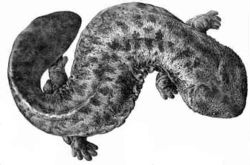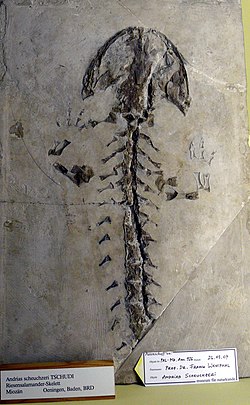Giant salamander
The giant salamanders are a family of large aquatic amphibia, the Cryptobranchidae.
| Giant salamander | |
|---|---|

| |
| Andrias japonicus | |
| Scientific classification | |
| Kingdom: | |
| Phylum: | |
| Class: | |
| Order: | |
| Family: | Cryptobranchidae
|
They are the largest living amphibians. The Japanese giant salamander (Andrias japonicus), reaches up to 1.44 m (4.7 ft), feeds on fish and crustaceans, and has been known to live for more than 50 years in captivity.[1] The Chinese giant salamander (Andrias davidianus) can reach a length of 1.8 m (5.9 ft).[2]
They live in brooks and ponds in the eastern United States (the hellbender), and in China and Japan.
Anatomy
Cryptobranchids are large, fat salamanders, with folds of skin along their flanks. These help increase the animal's surface area, allowing them to absorb more oxygen from the water.
Their metamorphosis from the larval stage is incomplete, so that the adults retain gill slits (although they also have lungs), and lack eyelids.
Chinese giant salamanders have lived as long as 75 years in captivity. It eats aquatic insects, fish, frogs and also crabs and shrimps. [3]
Hunting habits
They hunt mainly at night, and as they have poor eyesight, use sensory nodes on their head and body to detect tiny changes in water pressure, allowing them to find their prey.[4]
Reproduction
During mating season, these salamanders will travel upstream. After the fertilization of the eggs, the male will guard them for at least six months. At this point, the offspring will live off their noticeable stored fat until they are ready to hunt. Once ready they will hunt as a group rather than individually.
Scientists at Asa Zoo in Japan have recently discovered that the male salamander will spawn with more than one female in his den. Sometimes the male "den master" will also allow a second male into the den, but the reason for this is unclear.
Scientific names
- Genus Cryptobranchus (hellbenders)
- Hellbender (Cryptobranchus alleganiensis )
- Genus Andrias (giant salamanders)
- Chinese giant salamander (Andrias davidianus)
- Japanese giant salamander (Andrias japonicus)
- Genus Aviturus (Aviturus exsecratus)
- Genus Zaissanurus (Zaissanurus beliajevae)
Giant Salamander Media
A Chinese giant salamander in the Shanghai Aquarium.
References
- ↑ Andrias japonicus. AmphibiaWeb: Information on amphibian biology and conservation. 2012. Berkeley, California: AmphibiaWeb. Retrieved 13 December 2012.
- ↑ Andrias davidianus. AmphibiaWeb: Information on amphibian biology and conservation. 2012. Berkeley, California: AmphibiaWeb. Retrieved 13 December 2012.
- ↑ Lanza B. Vanni S. & Nistri A (1998). Cogger H.G. & Zweifel R.G (ed.). Encyclopedia of Reptiles and Amphibians. San Diego: Academic Press. pp. 69. ISBN 0-12-178560-2.
- ↑ Earth's endangered - Chinese giant salamander facts
Other websites
- Eastern Hellbender Fact Sheet Archived 2007-02-05 at the Wayback Machine
- Japanese Giant Salamander Archived 2005-02-07 at the Wayback Machine
- Cryptobranchid Interest Group
- Chinese Giant Salamander from ARKive
Facts Status Description Range Habitat Biology Threats Conservation Find out more Glossary References View all
| Wikispecies has information on: Cryptobranchidae. |




